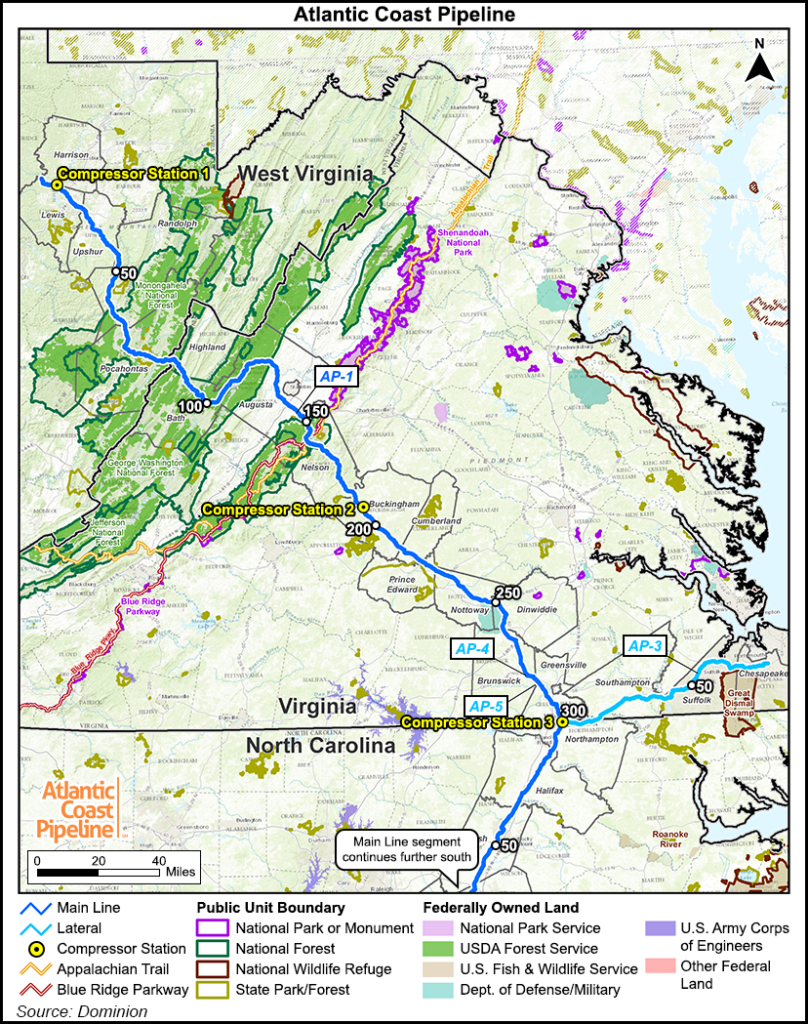Regulatory | Infrastructure | NGI All News Access | NGI The Weekly Gas Market Report
FERC Rejects Enviro Argument, OKs ACP Tree Clearing in Virginia
Brushing off calls from environmentalists to halt construction, FERC on Tuesday authorized Atlantic Coast Pipeline LLC (ACP) to move forward with tree clearing at a compressor station site in Buckingham County, VA.

Federal Energy Regulatory Commission staff this week granted a request to conduct non-mechanized tree clearing at ACP’s Buckingham County Compressor Station and at the nearby Woods Corner Metering and Regulating Station.
While seemingly limited in scope, the notice to proceed marks a step forward for a project whose every regulatory approval has seemingly been the subject of opposition and/or litigation. Recent decisions by the U.S. Court of Appeals for the Fourth Circuit to stay necessary federal approvals for the pipeline have led to periodic work stoppages and created regulatory uncertainty.
Late last month, the Fourth Circuit stayed decisions by the U.S. Forest Service allowing ACP to conduct tree clearing, blasting and trenching in the George Washington and Monongahela national forests in Virginia and West Virginia pending review of a challenge filed by the Southern Environmental Law Center (SELC) and the Sierra Club.
By allowing ACP to proceed with the limited tree-clearing work in Buckingham County, FERC is effectively rejecting the SELC’s argument that the Fourth Circuit’s stay necessitates a broader shut-down of work on the project.
FERC itself established a precedent for such a shutdown when it decided in August to stop all construction on the pipeline for more than a month after the Fourth Circuit vacated key permits from the U.S. Fish and Wildlife Service and the National Park Service.
Though the permits only applied to a portion of the 600-mile pipeline, FERC said at the time it was forced to issue the order because the project did not have all the necessary authorizations to continue. FERC lifted the order once those agencies issued revised permits.
SELC said in an October FERC filing that the same logic behind the August stop-work order applies to the Fourth Circuit’s more recent decision.
“The problem is more dire here because, unlike the National Park Service permit, the Forest Service permit authorizes crossings of noncontiguous lands,” SELC told FERC. “Allowing construction to proceed while Forest Service approvals are on hold risks littering the landscape with pipeline segments that may never be connected.”
ACP would originate in West Virginia, pass through Virginia and into North Carolina to move 1.5 Bcf/d of Appalachian natural gas to the Southeast. The project is a joint venture of Dominion Energy, Duke Energy, Piedmont Natural Gas and Southern Company Gas.
© 2024 Natural Gas Intelligence. All rights reserved.
ISSN © 1532-1231 | ISSN © 2577-9877 | ISSN © 1532-1266 |
